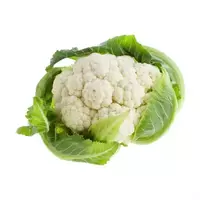Cauliflower

When wild, cauliflower is not found. It is an unequivocally cultured plant. For a long time, cauliflower was called Syrian. This name transparently hints at the homeland of cauliflower. From Syria, cauliflower "went" to lovers of all kinds of culinary innovations - the Spaniards. And already they have introduced cauliflower into the food culture of Europeans. The mass distribution of cauliflower began in the 14th century.
However, in our country, cauliflower appears only in the 18th. At the court of Catherine II, only the richest nobles could afford this delicacy, because cauliflower was not grown with us, but was delivered from abroad. Cauliflower varieties that can take root in our climate? were withdrawn a little later.
Nowadays cauliflower is a frequent and welcome guest on every table. Unlike traditional white cabbage, cauliflower has a more subtle taste and surpasses it in versatility in cooking. In addition, cauliflower is a real gift to culinary aesthetics. Already her appearance is a real pleasure.
Benefits of cauliflower
But not only that is the benefit of cauliflower. In addition to the obvious advantages in external and taste qualities, cauliflower is unusually nutritious and indispensable for human health. What we're used to thinking of as fruit is actually just cauliflower shoots. Accordingly, they retain a much larger amount of useful substances.
It contains quite a lot of organic acids, vitamins C, B, A, PP. Cauliflower also contains potassium, calcium, sodium, iron, phosphorus and other invaluable minerals. Cauliflower should be present in the diet for diseases such as gastritis, numerous liver and kidney diseases. It is recommended to be used for bronchitis and other pulmonary diseases. Cauliflower is one of the main foods recommended for dietary nutrition.
The beneficial properties of cauliflower as a product that contributes to weight loss are explained by the fact that it contains proteins that are easily absorbed and maintain the figure in excellent shape, and the body is in excellent condition. The calorie content of cauliflower is only 30 kcal. per 100 gr, which is quite low. And the generous presence of vitamins only contributes to painless and safe weight loss and indicates the benefits of cauliflower.
Harms cauliflower
The dangers of cauliflower may be indicated by the fact that it is one of those products that can cause allergies. Therefore, before drinking cauliflower, it is better to consult with a specialist. Also, doctors do not recommend cauliflower for gout.
cauliflower 30 kCal
Energy value of cauliflower cabbage (Ratio of proteins, fats, carbohydrates - ju):
Proteins: 2.5 g (~ 10 kCal)
Fats: 0.3 g (~ 3 kCal)
Carbohydrates: 4.2 g (~ 17 kCal)
Energy ratio (b | y): 33% | 9% | 56%
 Español
Español Français
Français Português
Português Русский
Русский 简体中文
简体中文 繁體中文
繁體中文 日本語
日本語 한국어
한국어 العربية
العربية Türkçe
Türkçe Қазақ
Қазақ Deutsch
Deutsch Italiano
Italiano Українська
Українська
